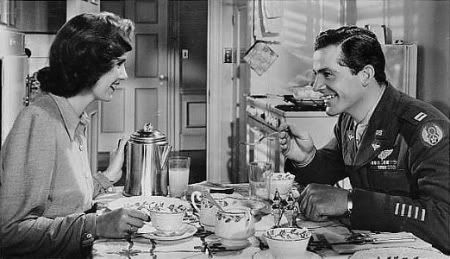
Fredric March (l.) and Dana Andrews (r.)
TCM is showing one of the great movies of all time, The Best Years of Our Lives on Tuesday, February 5, at 8:00 PM ET. The movie won a slew of Academy Awards, including the Best Picture of 1946, as well as a second Best Actor Oscar for Fredric March. Allow me, however, to make the case that the Academy honored the wrong man: March's costar, Dana Andrews puts in the better performance.
For those who don't know the plot, The Best Years of Our Lives looks at three soldiers returning home from World War II, and the challenges they face readjusting to civilian life. Fredric March plays Al Stephenson, a well-to-do banker with a loving wife (Myrna Loy) and two kids (Teresa Wright and Michael Hall). He has in many ways the tradition lead role, as it is through the viewpoint of his family that much of the action is seen. But his is a relatively easy readjustment. (At least, it's made to appear the easiest, by a good ways, of the three main characters, as well as compared to other ex-soldiers in minor roles in the movie. I don't claim to know how easy or difficult readjustment was for any soldier after years of fighting in Europe or the Pacific.)
Dana Andrews' character, on the other hand, has a much more difficult time of things. Andrews plays Fred Derry, a pilot who grew up on the wrong side of the tracks (literally) in a ramshackle apartment. Derry didn't have much of a life on the home fromt before joining the war, but has a distinguished service record.  Unfortunately for him, this doesn't help him once the war is over: he's forced to take the job he held before he left for the war, as a drugstore soda jerk. Derry is also suffering through an unhappy marriage to a woman (played by Virginia Mayo) with whom he rushed into marriage just before leaving for the war. She spent the war working in a nightclub, earning good money and enabling herself to live the good life, and she wants to continue living that good life. But Fred Derry faces the humiliating prospect of being completely unable to provide any semblance of such a life.
Unfortunately for him, this doesn't help him once the war is over: he's forced to take the job he held before he left for the war, as a drugstore soda jerk. Derry is also suffering through an unhappy marriage to a woman (played by Virginia Mayo) with whom he rushed into marriage just before leaving for the war. She spent the war working in a nightclub, earning good money and enabling herself to live the good life, and she wants to continue living that good life. But Fred Derry faces the humiliating prospect of being completely unable to provide any semblance of such a life.
In addition, Derry has problems dealing with the things he saw during the war. The first night we meet him, we see that he suffers from nightmares about his period of service. He's ministered to by  the Stephensons' daughter, who just happened to spend the war working as a nurse. She falls in love with him, although this is of course complicated by the fact that he's married. But having grown up, [first name] realizes that Fred is stuck in a loveless marriage, so she'll "solve" the problem -- by breaking up the marriage! (This brings up one of the funnier lines in the movie, when Al asks her, "How are you going to break up their marriage? With an axe?")
the Stephensons' daughter, who just happened to spend the war working as a nurse. She falls in love with him, although this is of course complicated by the fact that he's married. But having grown up, [first name] realizes that Fred is stuck in a loveless marriage, so she'll "solve" the problem -- by breaking up the marriage! (This brings up one of the funnier lines in the movie, when Al asks her, "How are you going to break up their marriage? With an axe?")
What all this means is that Andrews has quite a bit more to go through than March. Andrews effortlessly displays the full gamut of emotions, and makes us feel sympathy for his character to a much greater extent than we do for Al Stephenson. (Not that Stephenson is unsympathetic; it's just that he doesn't need our sympathy.) And for that, Andrews is more deserving of the Oscar than March.
A Last Hurrah?
5 hours ago

3 comments:
Exactly! I just watched this film again last week, and for days, I was haunted by the fact that March won for best actor and Andrews didn't.
I mean, every single member of that main cast is terrific, but if you have to single one of 'em out...I agree they picked the wrong guy.
Nice blog. :)
Just in the past week I watched The Best Years of Our Lives on TV for the second or third time. It's a powerfully put together film, and as you say all the main characters are well performed. But Fred, Dana Andrews' character, was the one I most easily identified with. You are so right that Andrews was as deserving, if not more deserving, of the Best Actor nomination and winning.
It's a total travesty that Dana Andrews did not win the Best Actor award for his brilliant performance as Fred Derry in Best Years. That he was never nominated for anything just shows how farcical the whole Oscar system is.
Post a Comment